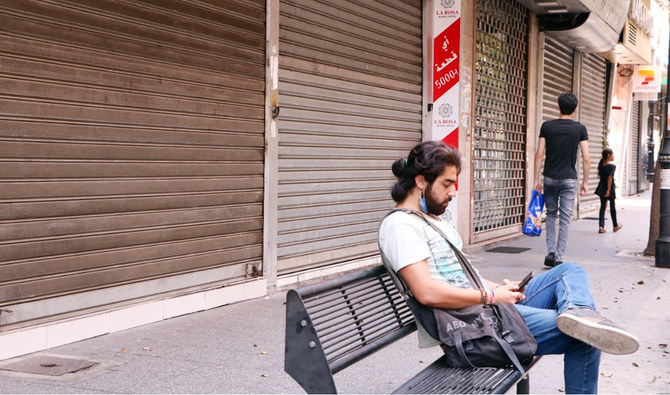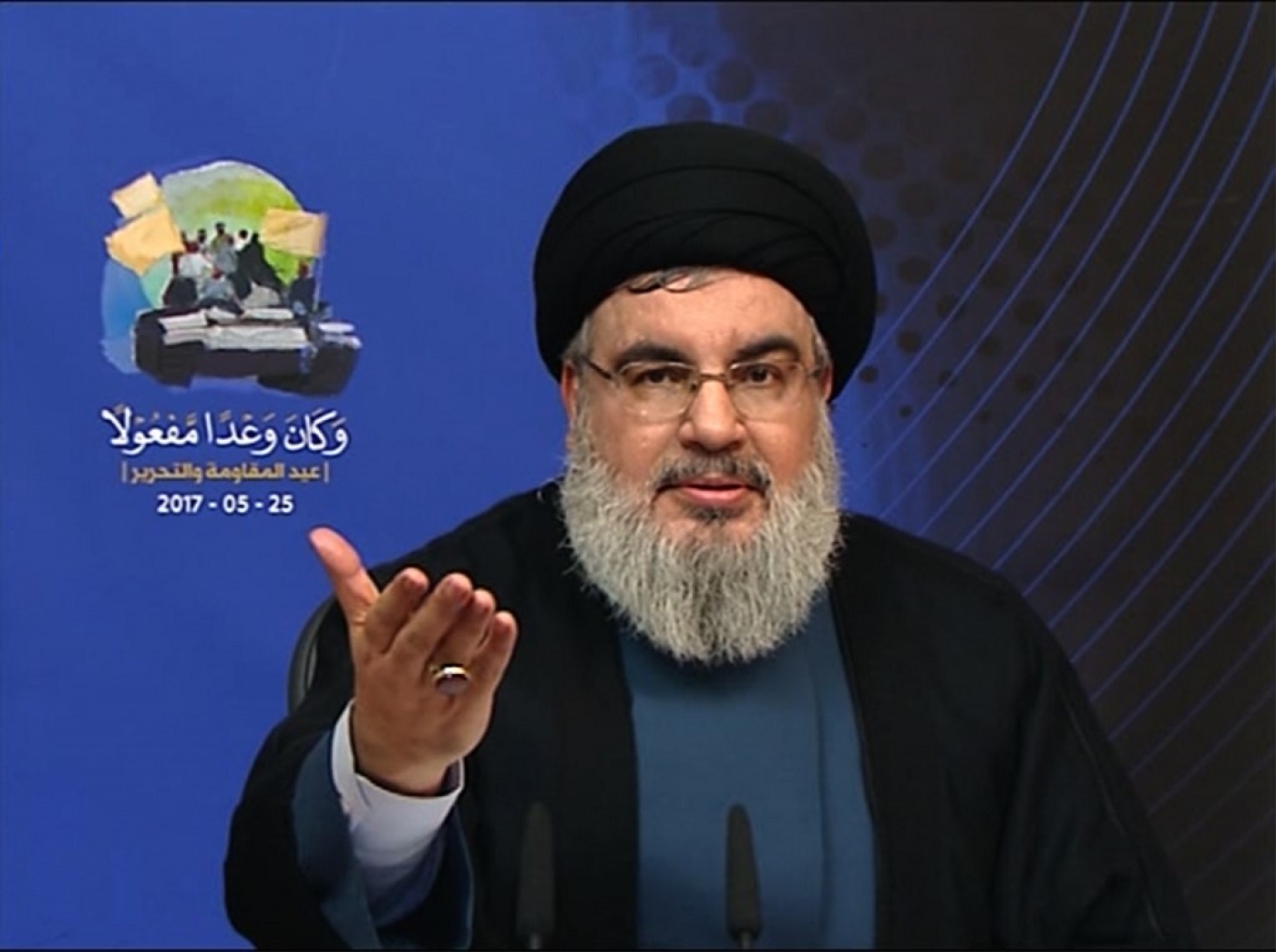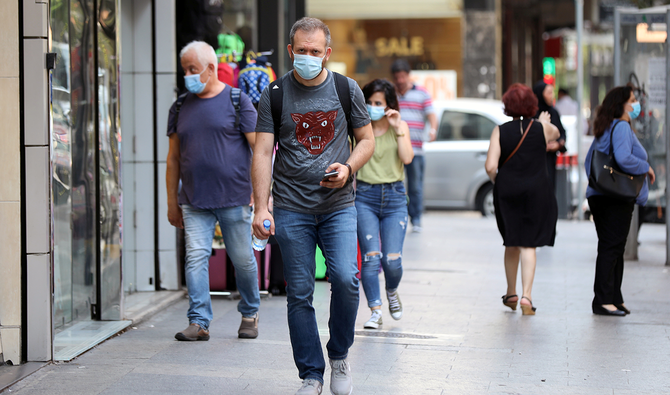by naharnet.com — The Israeli army on Saturday sent a spy balloon over the Lebanese border town of Houla, Lebanon’s National News Agency said. The agency said the balloon hovered over the town for 15 minutes. Cautious calm is meanwhile engulfing the Lebanese-Israeli border, NNA added. Tensions have surged in the border area since Israel […]

by Carine Hajjar ,National Review — news.yahoo.com — This week, while reading a slew of WhatsApp messages from family in Lebanon, I was shocked to hear that my cousin Dalila had to pay the equivalent of USD 200 for dairy products for her family. Expensive dairy is the least of Dalila’s worries, however. As a new mother, she is facing quotas when buying products for her baby boy. “Last month was hard because I was only able to buy two of each item — a maximum of two diapers!” she told me. Her biggest problem is getting formula: “All baby formula is out of stock. They are not going to bring them to Lebanon anymore.” This is the new normal for Dalila and all mothers during Lebanon’s second month of hyperinflation. But for me, this is a shocking departure from the Lebanon I remember. It was just two years ago that I spent a few weeks in Beirut with my family, celebrating Dalila’s wedding. We spent those summer nights going to many of Beirut’s fabled restaurants and enjoying the vibrant shopping centers, the streets filled with sleek sports cars, and the extravagant hotels that the Mediterranean nation is known for. During the day, we’d venture to different beaches, amazed at the lavish coastal resorts. On family visits to surrounding villages, we were greeted with trademark Lebanese hospitality. From the moment you step into a house, there is a full mezza set out with hummus, tabbouleh, grape leaves, nuts, and much more. Just when you’re about to burst, platters of kebabs, rice, and vegetables are brought out, topped off by towers of fruit for dessert. And, of course, an ornate hookah was at the disposal of any visitor as they ate and drank.
In a word, it was a place of abundance. But the “land of milk and honey,” where locals boast of their ability to “ski and swim in one day,” is now financially gutted, leaving its citizens wanting for electricity and even meat. The rumblings began in October, when a proposed WhatsApp tax sparked massive protests against the Lebanese government and its decades of corruption. Since then, the Lebanese economy has crumbled and the nation has defaulted on its Eurobond loans, government services (which were always unreliable) have virtually disappeared, and Lebanon has become the 62nd case in history of hyperinflation, with a rate of 462 percent. Lebanon and Venezuela are the only two countries in the world currently experiencing hyperinflation. Many chalk up the nation’s crisis to years of a government-led Ponzi scheme. In a New York Times op-ed, Lina Mounzer, a Lebanese citizen, points to years of unsustainable interest rates and debt financing by Lebanese banks in conjunction with the central bank, the Banque du Liban, and the government. Mounzer notes that politicians achieved “individual enrichment” using “increased public debt.” More specifically, Lebanese banks offered exorbitantly high interest rates to attract foreign currency — mainly U.S. dollars — to maintain the peg for the Lebanese pound (LBP).

by middleeasteye.net — US President Donald Trump has renewed a 13-year national emergency order over the political situation in Lebanon, citing Iran’s “ongoing” weapons transfers to Hezbollah. The order ensures the legal grounds for the US president to levy sanctions and “to deal with the unusual and extraordinary threat to the national security and foreign policy of the United States” due to Hezbollah’s presence in Lebanon, a statement released by the White House on Wednesday said. The administration said “certain persons” – alluding to members of Hezbollah and its allies – were seeking to undermine the Lebanese government. Lebanon has been dealing with several crises during the past year, from the coronavirus pandemic to a plummeting economy and recent skirmishes with the Israeli army on its southern border. Hezbollah, an Iran-backed group, is a major political party in Lebanon and consolidated its influence in the state’s affairs in 2018 after winning, along with its allies, a small majority in national elections. The US designated Hezbollah a “foreign terrorist group” in 1997.
Despite Hezbollah’s growing influence within the Lebanese government, the White House’s order alleged “certain persons” were deliberately working to “break down” the rule of law in Lebanon “through politically motivated violence and intimidation”. “Certain ongoing activities, such as Iran’s continuing arms transfers to Hizballah – which include increasingly sophisticated weapons systems – serve to undermine Lebanese sovereignty, contribute to political and economic instability in the region, and continue to constitute an unusual and extraordinary threat to [US] national security and foreign policy,” the White House said. Washington is particularly concerned by those allegedly seeking to “reassert Syrian control or contribute to Syrian interference in Lebanon”, the order said. The annual move, entitled “Continuation of National Emergency with Respect to Lebanon”, has been renewed every year since it was declared by former President George W Bush in 2007. Bush’s order said the United States would freeze the property and assets of anyone trying to undermine Lebanon’s democratically elected government.

By RAY HANANIA — arabnews.com — CHICAGO: Texas Senator Ted Cruz is pushing new legislation that would deny US funding to any nation that provides sanctuary or support to the Lebanese Hezbollah movement, which serves as a military proxy for Iran. Now before the Senate Committee on Foreign Relations, Senate Bill 3691 was introduced by Cruz, a Republican, in May. It will receive a hearing before it is sent to the full Senate, where it is expected to be approved. The legislation specifically targets Lebanon’s government, of which Hezbollah is a part. In conjunction with the Foreign Assistance Act and the Arms Export Control Act, the bill would prohibit the US government from assisting any Lebanese government of which Hezbollah is a part, over which it exercises undue influence, or in which “a ministry, agency, or instrumentality of that government is effectively controlled by Hezbollah.”
To become law, the bill would have to also be passed by the US House before being sent to President Donald Trump, a critic of Hezbollah, for his signature. Hezbollah was designated a terrorist organization by the US in 1995. The directive does not distinguish between Hezbollah’s military arm and its political leadership. In 2013, Hezbollah’s militia was designated a terrorist organization by the EU after the group was accused of blowing up an Israeli tour bus in Bulgaria. Hezbollah remains a powerful force in Lebanon, where it has received the backing of Lebanese Prime Minister Hassan Diab. Together with its Christian political ally, the Free Patriotic Movement headed by Lebanese President Michel Aoun’s son-in-law Gebran Bassil, Hezbollah remains one of Lebanon’s most potent political organizations.

by Press Release: Euro-Med Monitor — The Lebanese security and judicial authorities continue to suppress public freedoms and restrict freedom of publication, especially with regard to publishing information and records about politicians or influential figures, the Euro-Mediterranean Human Rights Monitor said. The Directorate General of Operation and Maintenance of the Lebanese Ministry of Communications decided to block www.shinmimlam.com website which facilitates the publication of data that is available on the Lebanese Ministry of Justice website and that is available for the public to view in the commercial registry. The decision to block the website was issued by the interim relief judge of Beirut on June 16th, although the information displayed on the website does not reveal personal data of lawyers but provides existing information. “What raises concern the most is that the appeal to block the website came from the Beirut Bar Association, which is supposed to be the first defense line for public freedoms, and a main supporter for enhancing transparency and accountability,” said Tariq Hajjar, Euro-Med Monitor’s legal advisor. “The Association’s behavior is fundamentally inconsistent with the principles and ethics that govern its work,” he added, warning of the dangerous repercussions of the decision on the transparency and integrity of its work.

by AFP — FAQRA: Amid designer sunglasses, champagne buckets and luxury cars, Lebanon’s economic crisis is not immediately obvious in Faqra. Digging into a salad at an exclusive country club in the Lebanese mountains, Zeina El-Khalil was glad to be there for the summer. “The atmosphere in Beirut has become heavy and depressing. Reality is everywhere. But here we feel like we’re in another country,” she said. Lebanon is mired in its worst economic crisis in decades, with the downturn sparking soaring inflation and plunging almost half the country’s population into poverty. For the wealthy, trips abroad were off as banks blocked dollar withdrawals or transfers and the coronavirus disease (COVID-19) complicated international travel. But some of Lebanon’s wealthiest families have escaped to the Faqra Club, perched 1,600 meters (5,250 feet) above the Mediterranean. “Usually we spend our holidays abroad, but this year we can’t travel for financial reasons and COVID-19,” said El-Khalil.
Nestled in a mountain resort town famous for its ski slopes, the Faqra Club is an oasis of luxury in an otherwise collapsing country. Its motto, according to the official website, is “Life at the top.” Expensive cars pack the parking lot, while club members shuffle between its many facilities, including stables, a tennis court and a 9D movie theater. Around a long swimming pool, bronzed bodies sprawl on sofas and sun loungers, sipping cocktails, as music blasts in the background. “Life must go on,” said Sara, a 26-year-old lawyer. “We won’t stay trapped in the house.” Sealed off from the woes plaguing the rest of the country, the Faqra Club has become a magnet for those looking to do brisk business.

by thenational.ae — Sunniva Rose — “Have you seen this?” asked “Walid”, a generator owner in Beirut, as he held up a plastic bottle in disbelief. It was filled with two different liquids: yellow at the top, and transparent at the bottom. “This is diesel mixed with water that I bought on the black market last week,” Walid said. “It broke four of my filters.” Compounding Lebanon’s already existing electricity problems, its local “mafia” of private generators owners went on a one-hour strike on Tuesday. They threatened to turn off all of the country’s generators next week for an entire day. They are unhappy because the country’s economic crisis forces them to buy diesel, which is sometimes tainted, at inflated prices. “I have spent as much money last month as I usually do in six months,” Walid said. “I don’t know if I’ll be able to continue to operate.”
He stood in the dark in his small basement office, regularly wiping his brow with a handkerchief because of the sweltering heat. Walid saidhe had spent 2.4 million Lebanese pounds, or $315 at the black market rate, to repair the filters that were broken by the tainted diesel. A strike by generator owners would cause a massive electricity shortage in the country. Lebanon’s state utility Electricite du Liban’s output only provides two hours of electricity a day on average in Beirut. It has been unable to produce enough electricity to satisfy demand since the end of Lebanon’s 1975-1990 civil war, with average cuts of three hours a day in the capital. They can increase to 12 hours a day in the countryside. Private generator owners stepped in to close the gap. They are technically illegal but operate freely. “They are called a mafia because they divide neighbourhoods up like drug dealers,” said Nizar Hassan, a Lebanese political analyst. “People don’t have the option to choose who they will subscribe with. “Generator owners also impose much higher fees on people than they should and do not respect prices imposed by the Energy Ministry.”

by arabnews.com — NAJIA HOUSSARI — BEIRUT: The Lebanese government agreed on Tuesday to reinforce coronavirus lockdown measures after a spike in new cases threatened to overwhelm the crisis-hit country’s health care system. Lebanon, a country of some 6 million people, has recorded a total of 3,879 cases of COVID-19, including 51 deaths. Activists on social media shared a video of a Lebanese man in his car arguing with security forces after being fined for failing to wear a face mask. Authorities decided to shut down the country again following an alarming increase in the number of COVID-19 cases. Ministers on Tuesday were tested for the virus before taking part in ministerial session at the Presidential Palace.
President Michel Aoun called for “stricter application” of the lockdown order to limit the “negative repercussions on citizens and residents,” criticizing “people’s disregard for the preventive measures.” Minister of Health Hamad Hassan said: “People are not abiding by the preventive measures, and people traveling to Lebanon are not respecting the isolation period.” From Thursday, the country will shut down for five days with another five-day lockdown next week. Bars, pubs, night clubs, malls, pools, gyms, churches, mosques and game centers will be closed, and all sports competitions, events and religious gatherings will be canceled. People over 65 will be told to stay at home and avoid social activity. Security forces have arrested two Syrians who allegedly forged PCR tests showing a negative result for sale to Syrians wishing travel to their homeland.
by aa.com.tr — The Turkish foreign ministry slammed allegations Tuesday by Lebanese politicians that claimed Ankara supported protests in Lebanon. “The allegations brought up by some Lebanese politicians, that our country supported the protest demonstrations in the north of Lebanon, and that it aimed to improve its influence in this region of Lebanon, are deprived […]
By Sarah Maisey — thenational.ae — Lebanese-French composer and pianist Rami Khalife has unveiled a new composition titled New Time, penned exclusively for Italian fashion brand Brunello Cucinelli. Released alongside footage of Khalife playing the piece on a piano among the poppy fields of Castelluccio di Norcia in central Italy, the piece is said to allude to the changes brought about by the seasons. An original composition written and played by Khalife, it was recorded in Paris, at the Abbey Road Institute.
The title of the piece is taken from a letter written by Cucinelli in response to the Covid-19 crisis in April, when the large-scale impact of the pandemic was becoming clear. Addressing his shareholders, he wrote: “The rising of a new time has already begun from the shadows of a painful night; this new time, my esteemed friends, I see it brimming with fabulous opportunities, a bearer of new lifeblood, a creator of ideas revolving around a renewed desire for life … at the end of this all we will be different; we too, like time, will be somehow new. “Until a few days ago, the time that flows from one daily action to the next was driven by the frantic urgency of an ongoing haste and frenzy without a conscious reason; today time has changed its pace like in a melody where every musical beat falls where the score of creation wants it to be, and generates a music of memories and future that we won’t easily forget,” he said.



